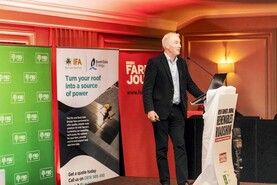The Climate Action Plan announced by Government on Thursday could have a profound impact on the rural economy and food security must be fully integrated in the plan, IFA president Tim Cullinan has said.
Cullinan said the emissions ceiling for agriculture announced by the Government on Thursday will be extremely challenging.
“The Government has fixed these targets without any proper assessment of the implications for individual farmers, the rural economy or food production.
“Teagasc data shows that only a third of Irish farmers are economically viable. With rising energy and transport costs, the economic viability of farms and rural businesses are being undermined.
"Farmers cannot do more for the environment and invest in emissions mitigation measures when their incomes are under such pressure,” he said.
Silo mentality
Cullinan said we cannot approach climate policy with a silo mentality. Carbon leakage, food security and farmers’ livelihoods must be fully integrated into the plan, he said.
“The Government must now engage in meaningful negotiation with elected farmer leaders to make a plan for the sector that can contribute to emissions reduction, but which does not impact on farmers' livelihoods.
"In addition, proper funding must be in place to help farmers implement climate action measures.
“The frustration for farmers is that they know that if less food is produced in Ireland, it will be produced elsewhere, with a higher carbon footprint,” he said.
Food security
“The world’s population is growing and will likely increase from 7.5 billion today to 10 billion by 2050. More food will be needed, not less,” he said.
The IFA is organising a protest in Dublin on Sunday 21 November to send a strong message to the Government that a proper plan needs to be put in place for the sector at farm level, which addresses economic, social and environmental sustainability.
KPMG analysis
A KPMG report, commissioned by the Irish Farmers Journal on the economic impact of a cut in emissions on agriculture found that a cut in emissions of between 21% and 30% could result in thousands of job losses and cuts to the national herd.






 This is a subscriber-only article
This is a subscriber-only article












SHARING OPTIONS: